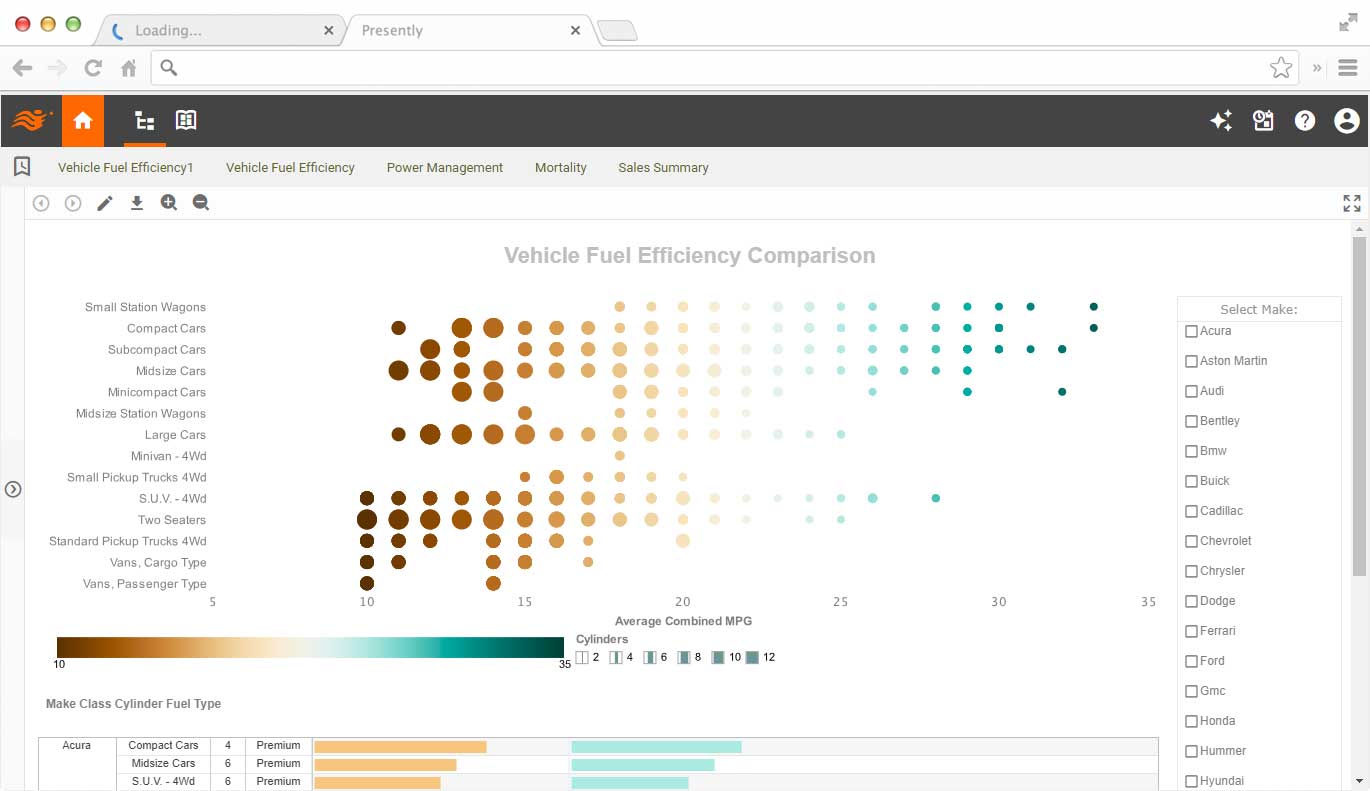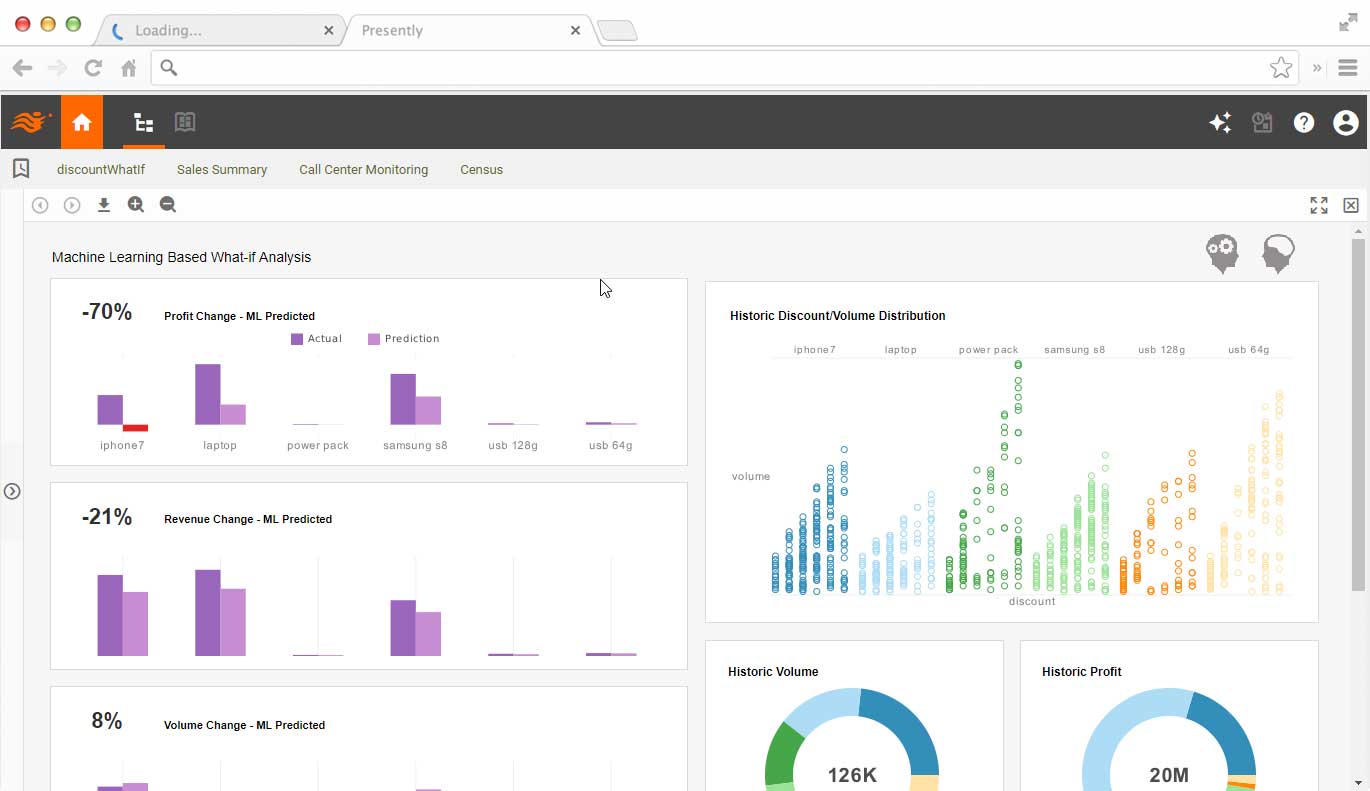Data Warehouses
InetSoft's data intelligence software has built-in, optimized data access for various types of data warehouses. Modern column-based data warehouses and long-established OLAP data warehouses are both well supported.

Visual Analytic Dashboards for Data Warehouses
InetSoft's visual analytic and data mashup software takes full advantage of data warehouses' processing power. The mashup engine pushes queries and data processing into data warehouses as much as possible but executes them when mashed up with other data. Visual dashboards empower business users with ad hoc analytics that directly tap into data warehouses.

| Actian Vectorwise | Amazon Redshift | EMC Greenplum |
| HP Vertica | IBM Netezza | ParStream |
| ParAccel | Others through an ODBC or Custom Connector | |
Examples of Supported OLAP Data Warehouses
| MS Analysis Service | SAP NetWeaver BW | Hyperion Essbase |
Data Mashup and Data Warehouses
The data mashup engine is a core technology in InetSoft's platform. This technology enables a more dynamic data layer that can quickly adapt to new business needs.
For existing data warehouses, data mashup allows users to combine dynamic business data with core data residing in a data warehouse. This flexibility allows data warehouses to focus on core data that are slow-changing and that have long term value.
When a data warehouse is not available, data mashup can be used as an alternative in many cases. Many data warehouses are created for performance reasons. Given InetSoft's high performance, in-memory data mashup cache, this reason alone will no longer warrant such a big investment. Many times, data mashup can also serve as a precursor for discovering data warehouse needs.

Big Data and Data Lakes - a Data Warehouse Alternative
A data warehouse requires careful design and good ETL processes to populate it. On-going maintenance of such an infrastructure is normally an IT-heavy process. A Big Data-based data lake has become a viable option where raw data is analyzed directly.
InetSoft's data mashup platform is not just a stand-alone engine. It is built natively on the Apache Spark platform. This proven high-performance, in-memory platform is capable of churning through a large amount of data. InetSoft's data intelligence application not only provides intuitive visual analytics as dashboards and reports, but it can also be configured with a built-in Spark cluster to scale limitlessly.

More Resources About Data Warehouses
Data Warehouses Still Necessary - The Value of Data Warehouses: Data warehouses serve several vital functions that make them an essential component in many organizations: Data Integration and Consolidation: They are designed to aggregate data from various sources, transforming it into a consistent format. This is particularly crucial in organizations with diverse data sets from different departments or systems. Performance and Query Optimization: Data warehouses are optimized for complex queries and analytics. They use techniques like indexing and data partitioning to ensure that even with large datasets, queries can be processed efficiently...
Benefits of a Data Lakehouse - The data lakehouse's function as a centralized data store is at its core. A data lakehouse, in contrast to conventional compartmentalized techniques, gathers all of an organization's data, both organized and unstructured, into one readily accessible area. This centralization facilitates a more streamlined and effective data management process by making it easier to obtain and analyze data from many sources. Organizations may have a thorough understanding of their information environment and make better decisions by dismantling data silos...
Consistent Customer Data Across The Enterprise - That is also being called conforming dimensions for those that have been involved in data warehousing and data modeling. CDI, or Customer Data Integration, is consistent customer data across the enterprise. Again, this is a not new concept, but it is a new name, CDI. Remember 360 degrees around the customer, customer relationship management folks? The CRM folks keep inventing new terms of integrating customer data, because they have to deal with customer applications such as Call Center Campaign Management and Sales Force Automation that tend to keep customer data fragmented...